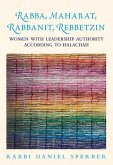RABBI DR. ELIEZER BERKOVITS' FINAL BOOK, Jewish Women in Time and Torah, is a critical examination of the status of women in Halakhah. It offers a coherent theological approach by which the eternal Divine nature of Torah must be upheld, and yet also recognize that the ever-changing status of women, reflected in our sacred texts, is linked to historical and social movements of humanity in the world at large. Berkovits makes several suggestions, based on a thorough examination of halakhic sources, to improve that status. The author's basic thesis is that the inferior status of women is a vestige of ancient culture. In the course of time, women have gained certain rights. But, Berkovits emphasizes, more remains to be done, especially in the spheres of ritual participation and marital rights, areas in which he makes a number of concrete halakhic suggestions. For example, he suggests that adequate halakhic justification exists for women to take upon themselves the mitzvah of donning tefillin or establishing their own prayer groups, as well as women reciting Shabbat kiddush for men or participating in a mixed-gender zimmun for Grace After Meals.
Bitte wählen Sie Ihr Anliegen aus.
Rechnungen
Retourenschein anfordern
Bestellstatus
Storno








